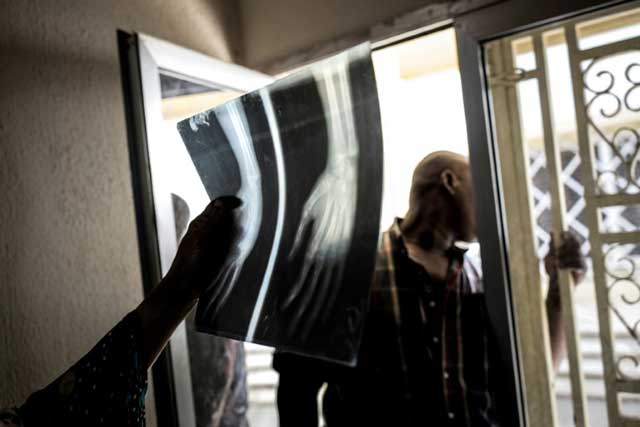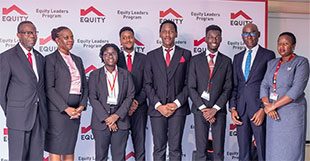
Conakry, Guinea | AFP | In a dingy room reeking of blood and sweat in Guinea’s capital Conakry, a volunteer doctor treats a man with bullet wounds in his legs as he tries to suppress his groans.
Hidden inside a gated compound a stone’s throw from the city centre, supporters of the West African state’s beleaguered political opposition treat men and boys they say were injured during raids by security forces.
Guinea has been rocked by huge protests since mid-October over fears that President Alpha Conde is seeking to use a referendum for a new constitution to stay in power.
Protests have often turned violent, drawing rebukes for security forces from human rights groups over their use of force and alleged abuses.
At least 31 people have died in the unrest to date, according to an AFP tally, including one gendarme.
Underscoring Guinea’s political polarisation, many of the deaths are thought to have occurred in Conakry opposition strongholds, where residents complain of routine harassment from security forces.
“Some of the wounded are afraid to go to the hospitals,” said a doctor working in the makeshift clinic, whom AFP is not naming for security reasons.
Residents of the wrong neighbourhoods fear they will be turned away from hospitals, or that security forces will pursue them there.
So many of the injured attend the hidden clinic run by the FNDC, an alliance of opposition civil-society groups which rejects the new constitution.
The clinic itself is rudimentary, consisting of one small, hot room run by volunteer medics. It treats about 50 people after every protest, leading FNDC member Ibrahima Diallo said.
Outside the room, about a dozen mostly teenagers — wearing bandages and splints, some barely able to talk — sit on upholstered chairs on a shaded terrace.
AFP spoke to 12 men and boys receiving treatment at the clinic last week. All said they came from known opposition districts in Conakry and that they were targeted despite not taking part in protests.
The interviews took place on March 1, two days after Conde postponed a referendum on his reforms after domestic and international criticism about the fairness of the vote.
Following the postponement, on February 29, protests broke out in opposition districts along one of the city’s main thoroughfares, where from sidestreets, youths hurled rocks at riot-gear-clad security forces.
It is unclear when the constitutional referendum will be held, although Conde has promised it will take place within two weeks of the original date of March 1.
The government says the new constitution would codify gender equality and ban female circumcision and underage marriage among other benefits.
But critics suspect a ploy by Conde, 82, to reset presidential term limits to zero and run for a third term later this year.
– Bruises, bullet wounds –
While some at the clinic had minor wounds such as bruising, or grazed skin from alleged near misses with tear-gas canisters, others appeared seriously hurt.
Several pointed to heavily bandaged limbs which they said had been hit by live rounds.
One of the young men was a frail and shaking eighteen-year old, with a cut lip and a bandage above his right eye. He took off his t-shirt to reveal a back laced with wide, dark bruises.
Police had detained him and beat him with cables, he said, speaking in his native Pulaar language, or Fulani. He was targeted “for nothing,” he said.
Another, a 15-year-old with a bandaged head, said he was having tea with his friends when he was picked up and beaten by security forces.
“It’s a habit of theirs,” he said, also speaking in Pulaar.
Other testimony was more violent still.
“I stumbled across the gendarmes,” said a 20-year old, who said he turned his back and ran. “I was knifed in the back,” he added.
The remaining men and boys spoke of similar abuses.
AFP was unable to independently confirm any of the events described. A police spokesperson said he was unaware of the events and the gendarmerie could not be reached for comment.
In an earlier interview with AFP, Guinean Security Minister Damantang Albert Camara admitted that no security forces were perfect but added that complaints were “systematically investigated”.
-‘Beatings are frequent’-
However, Amnesty International said in November that despite dozens of complaints of police violence, only one person had been prosecuted so far.
“Impunity continues to rule in Guinea,” it said.
None of the injured people AFP interviewed at the clinic said they had been protesting.
Mamadou Aliou Diallo, a FNDC activist at the clinic, argued that police behave well during highly-scrutinised protests.
“What they like to do is create victims where there are no journalists,” he said, describing reprisal raids inside the narrow streets of opposition neighbourhoods off the main road.
Francois Patuel, West Africa human-rights researcher, said that although there are no precise numbers on the number of people wounded since protests began last year, the figure was “definitely in the hundreds”.
“Beatings are frequent,” he said, referring to people detained by the police.
 The Independent Uganda: You get the Truth we Pay the Price
The Independent Uganda: You get the Truth we Pay the Price



